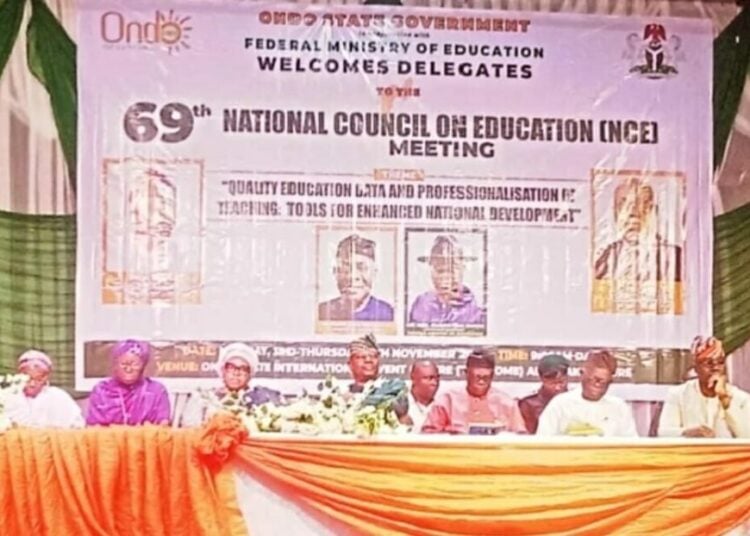As education leaders gather in Akure for the 69th National Council on Education (NCE), the focus is firmly on sustaining the reform momentum that has defined Nigeria’s education policy in recent years.
The meeting brings together key stakeholders determined to consolidate past achievements, review ongoing initiatives, and strengthen the foundations for quality and data-driven education nationwide.
Education remains one of the strongest pillars of Nigeria’s national development agenda. Over the years, the NCE has served as the highest policy-making body in the sector, setting direction, approving frameworks, and reviewing reforms to ensure that education responds to both national and global demands.
Each year, the Council provides a platform for federal and state stakeholders to converge, deliberate, and harmonise policy decisions that drive the nation’s education system forward.
The sessions of the NCE in recent years have reflected a renewed urgency towards reform continuity, digital transformation, and professionalisation of teaching.
The Council, which draws participation from Commissioners, Permanent Secretaries, Directors, and education experts across Nigeria’s 36 states and the Federal Capital Territory, has become a hub for charting new pathways for educational progress and accountability.
At its core, the NCE is designed to ensure that policies emanating from the Federal Ministry of Education are not only ratified but also translated into tangible actions at the state and institutional levels.
It serves as a bridge between national education objectives and local implementation, thereby promoting uniform standards and quality assurance. Through its resolutions, the Council often influences the shape of Nigeria’s education curriculum, teacher development strategies, digital learning policies, and infrastructural priorities.
The 68th National Council on Education, held in October 2024 in Abuja, marked a significant turning point in Nigeria’s efforts to modernise its education system. With the theme “Innovation, Digital Technology and Entrepreneurship: Tools for Educational and National Development in the 21st Century,” the Council placed a strong emphasis on aligning education with the realities of a global digital economy.
Among the key resolutions was the approval of revised curricula for Basic and Senior Secondary Education. The new curriculum adopted a competency- and outcome-based approach designed to equip learners with critical thinking skills, creativity, and entrepreneurial capabilities relevant to the evolving job market.
This reform was accompanied by a phased plan for teacher reorientation and retraining, ensuring that educators can effectively deliver the new content using modern pedagogical methods.
In another landmark decision, the Council approved the National Minimum Standards for Senior Secondary Schools, developed by the National Senior Secondary Education Commission (NSSEC).
These benchmarks set clear expectations for infrastructure, teaching quality, learner outcomes, and accountability mechanisms, raising the bar for secondary education nationwide. States were directed to begin preparations for implementation ahead of a nationwide rollout targeted for early 2026.
The Council also underscored the role of digital innovation in improving education delivery. It endorsed the introduction of digital classrooms, online lesson planning, and the gradual elimination of paper-based administrative processes in favour of digital communication within the Federal Ministry of Education.
Teacher development was another major highlight. The Council urged all education stakeholders including states, UBEC, TETFund, and the Teachers Registration Council of Nigeria (TRCN) to strengthen professional development initiatives, especially in the area of digital pedagogy.
It emphasised the need to reduce teacher workload through technology-enabled tools, fostering efficiency and motivation among educators.
The 68th NCE also reaffirmed the importance of state-federal collaboration in policy implementation. Since education in Nigeria is on the concurrent legislative list, the Council stressed that successful reforms require commitment at both levels of government.
It urged state ministries of education to align their plans with federal policies and ensure that resolutions are translated into action through clear timelines and measurable outcomes.
Building on the successes of last year, the 69th National Council on Education is presently being convened in Akure, Ondo State, under the theme “Quality Education, Data and Professionalisation of Teaching: Tools for Enhanced National Development.”
The ongoing meeting, hosted at The Dome, Alagbaka, has drawn education leaders, policymakers, and development partners from across the country.
The Permanent Secretary, Federal Ministry of Education, Mr Abel Olumuyiwa Enitan, commended the Ondo State Government for its hospitality and strong leadership in education.
He noted that the 2025 theme aligns closely with the Federal Government’s current priorities, particularly in the areas of teacher professionalism, data management, and quality assurance.
Enitan disclosed that 21 states have already migrated their basic and secondary school data into the digital NEMIS platform with UNICEF’s technical support, urging the remaining states to follow suit.
According to him, reliable data is the foundation for sound educational planning and evidence-based decision-making.
He further stated that the reforms introduced at the 68th Council were already yielding measurable progress and that the focus of the 69th session would be on deepening implementation, tracking impact, and ensuring continuity.
The 69th Council builds directly on the resolutions of the 68th, ensuring policy continuity and measurable progress. Key expectations from the ongoing session include strategies for expanding digital classrooms, strengthening teacher welfare, improving data reliability, and enhancing institutional accountability.
Furthermore, the discussions in Akure are expected to reinforce Nigeria’s transition towards a knowledge-based economy driven by skilled teachers, informed policies, and digitally empowered learners.
As the meeting continues through the week and concludes on Friday, a communiqué containing the policy decisions is expected to be released to the public containing new reforms.





